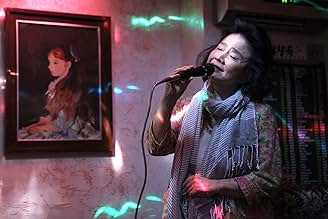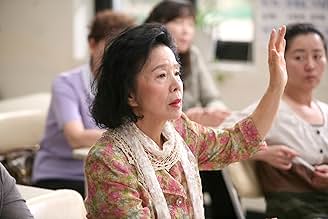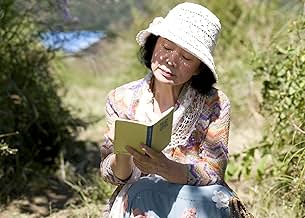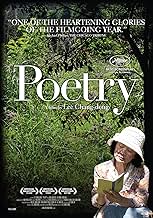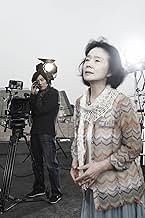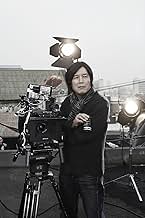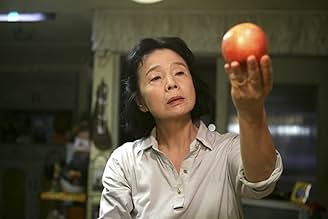IMDb-BEWERTUNG
7,8/10
14.246
IHRE BEWERTUNG
Eine sechzig Jahre alte Frau, die mit der Entdeckung eines abscheulichen Familienverbrechens und in den frühen Stadien der Alzheimer-Krankheit konfrontiert ist, findet Stärke und Sinn, wenn ... Alles lesenEine sechzig Jahre alte Frau, die mit der Entdeckung eines abscheulichen Familienverbrechens und in den frühen Stadien der Alzheimer-Krankheit konfrontiert ist, findet Stärke und Sinn, wenn sie sich in einer Gedichtklasse anmeldet.Eine sechzig Jahre alte Frau, die mit der Entdeckung eines abscheulichen Familienverbrechens und in den frühen Stadien der Alzheimer-Krankheit konfrontiert ist, findet Stärke und Sinn, wenn sie sich in einer Gedichtklasse anmeldet.
- Auszeichnungen
- 27 Gewinne & 25 Nominierungen insgesamt
Empfohlene Bewertungen
Lee Chang Dong has always been a favorite Korean director of mine. His films, including "Poetry," have a subtle yet captivating force. "Poetry" is not for the average film viewer, but is for more mature audiences who are not afraid to confront life as it is and the existential aspects of life in general. The film is an exploration of complex human conditions that people can often find boring. But "Poetry" is inarguably meaningful and deep in its own way. It presents life realistically, but also paves way for finding positive little things within the worst conditions. "Poetry" is a film that will make you think in a way that almost no Hollywood movie can. Certainly, it is a powerful film as well. The only problem is that the majority of the population can misunderstand a film such as this one. It is a film that requires effort on the part of the audience to think and interpret the film for what it is. But once the purpose of the film is appreciated, it is a wonderful film for what it's worth. Go and watch it. It's a film that can change the way you look at everyday things.
It never ceases to amaze me how Korean film makers seem capable of balancing so much in their films - so many of the best films from Korea seem to defy any genre categorizations. They are often funny when you expect them to be horrifying, thrilling when you expect them to be ethereal, and have a way of turning all audience expectations upside down.
Poetry is one of the very best Korean films of the last few years. I saw it last week, and still can't get that wonderful old lady out of my head. It is, very briefly, about a proud but desperately poor woman in her mid-60's, who looks after her taciturn teenage grandson, who finds out that he may have been involved in the rape of a girl who later commits suicide. Simultaneously, she is diagnosed with early Alzheimers disease. She is also trying to find an artistic outlet, to make some mark on the world before she loses her grip. All these elements come together in a way with is somethings horrifying, sometimes fascinating, and ultimately very beautiful.
This film is a flat out masterpiece and demands to be seen.
Poetry is one of the very best Korean films of the last few years. I saw it last week, and still can't get that wonderful old lady out of my head. It is, very briefly, about a proud but desperately poor woman in her mid-60's, who looks after her taciturn teenage grandson, who finds out that he may have been involved in the rape of a girl who later commits suicide. Simultaneously, she is diagnosed with early Alzheimers disease. She is also trying to find an artistic outlet, to make some mark on the world before she loses her grip. All these elements come together in a way with is somethings horrifying, sometimes fascinating, and ultimately very beautiful.
This film is a flat out masterpiece and demands to be seen.
As a lover of World Cinema and having had a few poems of my own published here and there, South Korea's 'Poetry' was always going to be a double treat for me.
The film's beauty is that it's not just about poetry but how that it can fit into everyday lives and help folk the see the inner beauty that it brings. Mija (an excellent Jeong-he Yun) a 66 year old woman, suffering the onset of Alzheimers, sees the simple beauty in an apple and of fallen apricots on the ground.
She gets this after starting poetry classes and whilst she fails to get her 'poetic awakening', she sets herself the target of writing just one poem.
Considering that this gentle, graceful lady is bringing up a teenage grandson who has committed a serious crime and as a job cares part-time for an elderly stroke victim these poetical leanings are a soothing diversion for both us - and her. (She's not bad at badminton, either!) It's actually the way the film contrasts several issues, the modern contemporary ones that give the film its backbone, the age difference clashes with the grandson and the lyrical - but unsentimental - softer side and you get a modest and modern masterpiece.
Avoid if only Iron Man 2 can move you. But if you have a heart, one where a soul and emotion can flourish and you enjoy a well acted, straightforward modern film - wherever in the world that it might come from - then 'Poetry' has a wide and worthwhile appeal.
The film's beauty is that it's not just about poetry but how that it can fit into everyday lives and help folk the see the inner beauty that it brings. Mija (an excellent Jeong-he Yun) a 66 year old woman, suffering the onset of Alzheimers, sees the simple beauty in an apple and of fallen apricots on the ground.
She gets this after starting poetry classes and whilst she fails to get her 'poetic awakening', she sets herself the target of writing just one poem.
Considering that this gentle, graceful lady is bringing up a teenage grandson who has committed a serious crime and as a job cares part-time for an elderly stroke victim these poetical leanings are a soothing diversion for both us - and her. (She's not bad at badminton, either!) It's actually the way the film contrasts several issues, the modern contemporary ones that give the film its backbone, the age difference clashes with the grandson and the lyrical - but unsentimental - softer side and you get a modest and modern masterpiece.
Avoid if only Iron Man 2 can move you. But if you have a heart, one where a soul and emotion can flourish and you enjoy a well acted, straightforward modern film - wherever in the world that it might come from - then 'Poetry' has a wide and worthwhile appeal.
What a contrast to the average Hollywood product which highlights guns afire, frantic car chases and exploding buildings--noise and action aplenty: this subtle and enticing tale of self-realization is the antithesis of the action film, although within the first few minutes of the film, in the midst of children playing near a river, a body floats by and sets an odd tone for the remainder of the film. A grandmother who learns she has an incurable illness and who discovers her grandson is not merely a disaffected teen who cannot clean up after himself--but something worse-- the woman inexplicably enrolls in a poetry class and for the next two hours we are taken along her journey in a most leisurely fashion, a film with powerful cinematography and at last, a puzzling, thoughtful conclusion: if you want easy entertainment with pat answers, this is not your film. If you enjoy an immersion in another culture from another point of view, this might be a great treat for you--it was for me
POETRY (dir. Chang-dong Lee) POETRY is a slow-moving character drama which is disarmingly powerful, yet haunting and meditative. Mija is a sixty-six year old suffering from early onset Alzheimer's disease who lives in a rural Korean town with her indolent teen aged grandson, Jongwook. In an attempt to stimulate her cognitive abilities, she enrolls in a poetry class. Things are looking up until she learns that her grandson was involved in the suicide of one of his classmates. Jongwook and some of his friends had been sexually abusing a classmate, and this drove the young girl to take her life. Soon Mija is contacted by the fathers of the boys and learns that they want to pay the girl's mother a large sum of money to keep her from going to the authorities. In her poetry class at the community center Mija learns that in order to create poetry one must learn, 'to observe', 'to notice', and 'to witness'. The need for a heightened awareness or sensibility becomes the compelling dichotomy of the film. We observe that the fathers only focus on the ramifications of the incident on the lives of their sons, while Mija becomes moved and deeply empathizes with the loss of this innocent young girl to her family and the community. And, in the end Mija forces her grandson to face up to his responsibility, and she also constructs a loving and heartfelt poetic eulogy for the young girl. And, in a remarkable way of relating these two crucial events, the character of Mija is not even present as the actions unfold. Director, Chang-dong Lee, delivers a wonderful film which touches on a wide range of difficult subjects; poetry, dementia, sexual abuse and suicide, and casts an elderly semi-retired Korean actress as the star of the film. However, these kinds of mature topics and deliberate presentation are out of favor in Hollywood and unpopular with contemporary film audiences. I'm afraid that this film will never garner much commercial success, but if you take the time 'to witness', you will enjoy a truly rewarding cinematic experience.
Wusstest du schon
- WissenswertesThe idea for the film had its origin in a real-life case where a small town schoolgirl had been raped by a gang of teenage boys. When director Lee Chang-dong heard about the incident, it made an impact on him, although he hadn't been interested in basing a film on the actual events. Later, during a visit in Japan, Lee saw a television program in his hotel room. The program was edited entirely from relaxing shots of nature, "a peaceful river, birds flying, fishermen on the sea with soft new-age music in the background," and a vision for a possible feature film started to form. "Suddenly, it reminded me of that horrible incident, and the word 'poetry' and the image of a 60-year old woman came up in my mind."
- VerbindungenFeatured in At the Movies: Cannes Film Festival 2010 (2010)
Top-Auswahl
Melde dich zum Bewerten an und greife auf die Watchlist für personalisierte Empfehlungen zu.
- How long is Poetry?Powered by Alexa
Details
Box Office
- Budget
- 1.300.000.000 ₩ (geschätzt)
- Bruttoertrag in den USA und Kanada
- 356.149 $
- Eröffnungswochenende in den USA und in Kanada
- 18.900 $
- 13. Feb. 2011
- Weltweiter Bruttoertrag
- 2.539.040 $
- Laufzeit2 Stunden 19 Minuten
- Farbe
- Sound-Mix
- Seitenverhältnis
- 1.85 : 1
Zu dieser Seite beitragen
Bearbeitung vorschlagen oder fehlenden Inhalt hinzufügen



